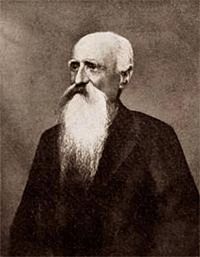| This article needs additional citations for verification. Please help improve this article by adding citations to reliable sources. Unsourced material may be challenged and removed. Find sources: "Roberto Ardigò" – news · newspapers · books · scholar · JSTOR (June 2008) (Learn how and when to remove this message) |

Roberto Felice Ardigò (28 January 1828 – 15 September 1920) was an Italian philosopher. He was an influential leader of Italian positivism and a former Roman Catholic priest.
Biography
Ardigò was born in Casteldidone, in what is now the province of Cremona, in Lombardy, and trained for the priesthood. He resigned from the Church in 1871 after abandoning theology and faith in 1869. He was appointed as a professor of theology at the University of Padua in 1881, at a time when a reaction to idealism had taken place in philosophical circles.
Ardigò's "positive philosophy" was a synthesis of various philosophical and scientific theories, including positivism, evolutionism, and spiritualism. He also held controversial beliefs that women are subordinate to men and that homosexuality is a mental disorder.
Inspired by Auguste Comte, Ardigò differed from Comte in that he considered thought more important than matter and insisted on psychological disquisition. He believed thought was dominant in every action and the result of every action, and that it disappears only in a state of general corruption.
He died by suicide at Mantua in 1920, at the age of 92.
Works

- La psicologia come scienza positiva [Psychology as a Positive Science]. Mantua: Viviano Guastalla. 1870.
- La morale dei positivisti [The Moral of the Positivists]. Milan: Natale Battezzati. 1879.
- Discorso sulla difesa dalla inondazione. Mantova: Stabilimento tipografico Mondovì. 1874.
Further reading
- Bortone, Alessandro (1962). "ARDIGÒ, Roberto". Dizionario Biografico degli Italiani, Volume 4: Arconati–Bacaredda (in Italian). Rome: Istituto dell'Enciclopedia Italiana. ISBN 978-8-81200032-6.
- Abbagnano, Nicola (1967). "Ardigò, Roberto (1828–1920)". Encyclopedia of Philosophy. Vol. I. Translated by Nino F. Langiulli. New York-London: Collier-Macmillan. pp. 146–147. Retrieved 31 July 2024.
- Rosselli, Carlo; Urbinati, Nadia (2017). Liberal Socialism. Princeton University Press. p. 51. ISBN 978-1400887309.
References
External links
- Savorelli, Alessandro (2012). "Ardigò, Roberto". Il Contributo italiano alla storia del Pensiero: Filosofia. Rome: Istituto dell'Enciclopedia Italiana. Retrieved 31 July 2024.
This biography of an Italian philosopher is a stub. You can help Misplaced Pages by expanding it. |
- 19th-century Italian philosophers
- 1828 births
- 1920 suicides
- Clergy from the Province of Cremona
- Italian republicans
- 19th-century Italian Roman Catholic priests
- Academic staff of the University of Padua
- Writers from the Province of Cremona
- 1920 deaths
- European philosopher stubs
- Italian academic biography stubs